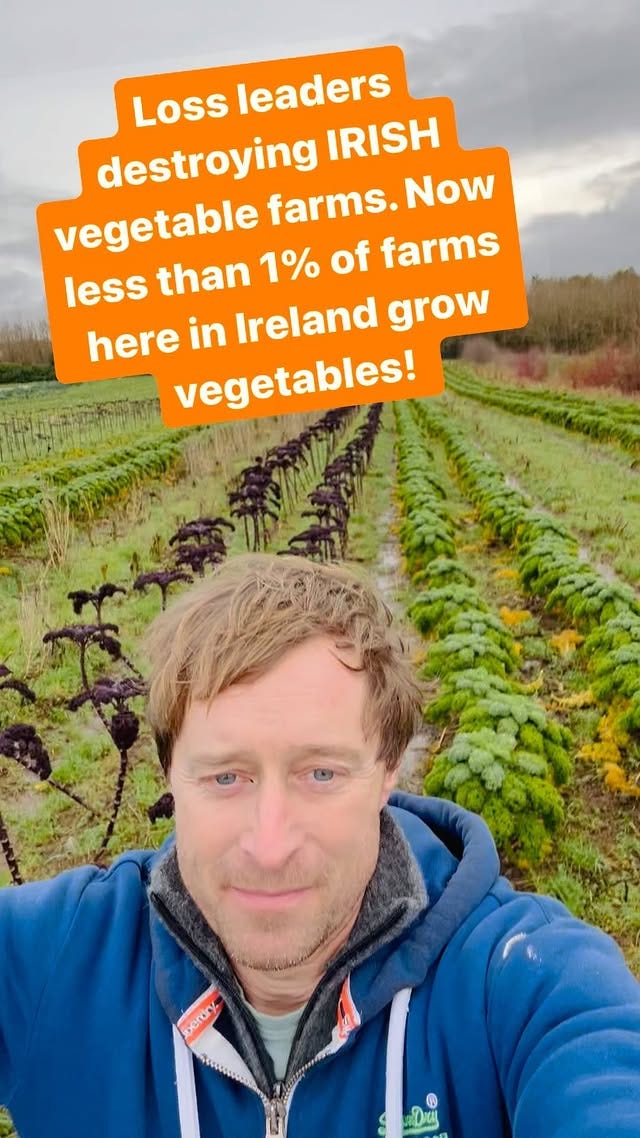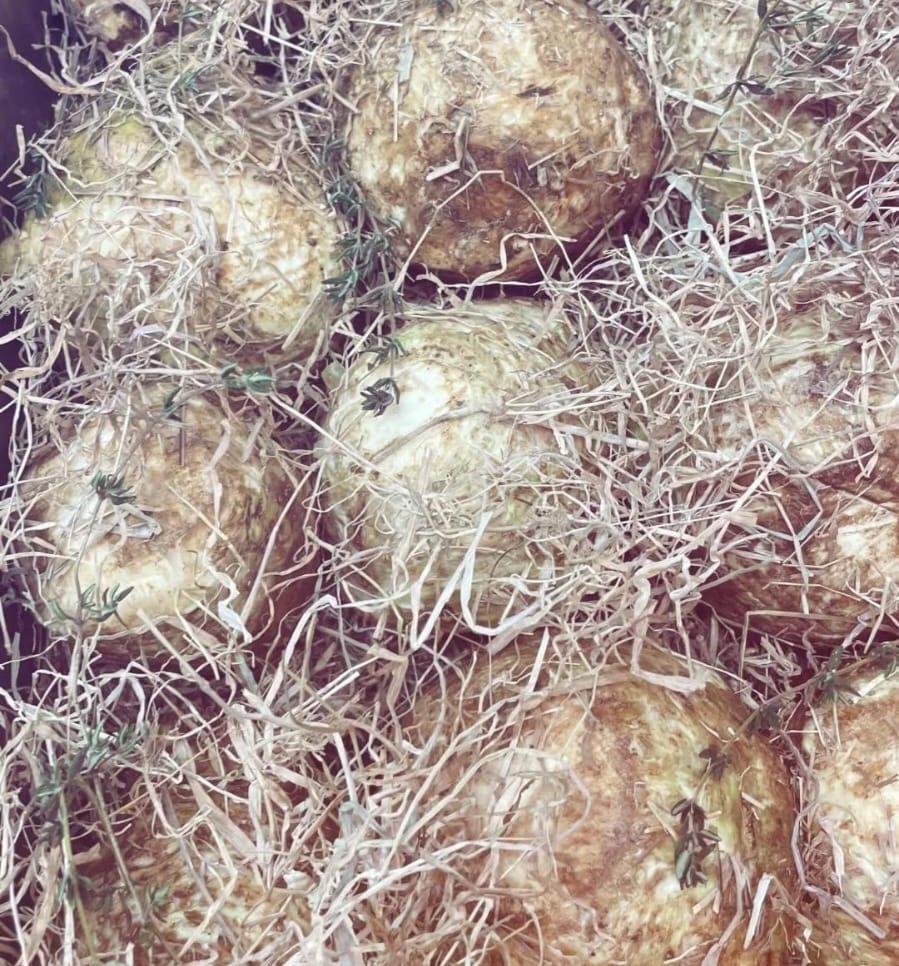Celeriac on the floor
The sad fate of field vegetables in Ireland.
We have never had a good attitude to vegetables in Ireland. Or at least not recently. And by recently, I mean since independence in 1922. It all turned towards beef and dairying, and while the economic war with Britain did make us more sufficient in terms of what we grew, our attitude towards the vegetable has been ‘supplementary’ at best. Indeed, you could argue it has been this way since since the bronze age.
Meat and two veg, etc. Two vegetables namely being potatoes and carrots. Or some other overcooked and dull option: cabbage, turnips (we were actually eating swedes), or perhaps parsnips. If there was a pea, it was a frozen pea. If there was sweetcorn, it was tinned sweetcorn.
Of course, a lot of this has changed in the 21st century. We have a vast array of vegetables in front of us when we visit the supermarket. From snow peas from Kenya to asparagus from Peru. We seem to have endless options to cook and experiment with vegetables. There are more vegetarian and vegan options in restaurants. There are more cookbook catering for vegetable cooks. And some are certainly excellent, like On Vegetables (Phaidon, 2017) by Jeremy Fox. Vegetable forward cooking appears to be here to stay.
So, are we eating and cooking more vegetables Ireland? And is it, if plant-based cooking is on the rise, sustainable to be a vegetable farmer in Ireland? The answer to the first is a tentative yes, certainly more than the last century; the answer to the second is a resounding no, even less than the last century. Often vegetables are the last things people on a plant-based diet consider eating.
Ireland is no country for vegetable farming.
There are two problems presented in the two questions above. Both are a question of importation and globalization. It does not pay to grow vegetables in Ireland. Period. It probably doesn’t pay much to grow anything in Ireland, except stem cells. Or computer chips, perhaps. Or social media companies…
I digress.
The situation for commercial vegetable growers in Ireland is in crisis. Cheap imports and the systematic nature of discounted vegetables in supermarkets means there is nowhere to go. From having over 400 in 1998, we now, as of a census by Bord Bia in 2023, have less than 60 ‘field’ growers in Ireland. Frighteningly, the largest 50 growers (in terms of land) account for 75% of the total field vegetable production area in Ireland.
Field growers doesn’t include all commercial ‘vegetable’ producers which still stands at over 200, but many of these producers are small and offer a much more bespoke offering. Several of these growers supply direct to restaurants, such as Aniar, and other restaurants around the country. They are the life blood of the restaurant, offering it something of a USP.
Even with the support of restaurants, who pay higher prices than those on offer in the supermarket, many small growers are simply leaving the industry. A recent conversation with Liam Heneghan, of Tribal Foods/Heneghan’s Nurseries in Athenry, regarding the state of the vegetable and fruit industry in Ireland:
‘I cannot see a future where the farm can support me in my old age and allow my daughter to raise a family if she chooses to have one. And I personally know of dozens of vegetable farms all around the country in the exact same place at the moment, many of them are resigned to selling up and getting out of the trade permanently in the near future’.
Many small vegetable growers feel the same, blaming the supermarkets for upending vegetable production in Ireland (and elsewhere). All is reduced to cost in this big bad food system of ours on this earth and if you can’t meet the price then you’re out the door. It doesn't matter if you have a field of broccoli. If its too expensive, you may as well plough it back into the ground and bring the cows home to graze.
In his recent blog ‘Only 60 field vegetable growers left in Ireland’ (October 4th, 2024) organic farmer Kenneth Keavey lamented:
‘So, as it stands the supermarkets, the kings and gatekeeps of this seemingly inexhaustible and abundant supply of produce are more to blame for the decline of the Irish vegetable industry than anything else. The bottom line is always the bottom line, and if the farmers had a model that was financially viable, they would still be here, I guess we can safely say they did not’.
In the race to the bottom, supermarkets vie with each other to outdo each other on price. The winner, it seems, is the consumer. It's all about value, isn't it?
Yet, in truth, the only winner is the supermarket. Irish farmers stop growing vegetables. Then there are no more Irish vegetables in the shops. Finally we all stop eating Irish vegetables.
It has already happened in many places around the country already. Go and see for yourself. Have a game of ‘where's Wally’ but with Irish vegetables.
This is not to say that some supermarkets are not making an effort. It would be remiss of me not to say. Indeed, if you see that vegetables are Irish, please try to purchase them. The additional cost is worthwhile, not only for our present farmers, but also for the future ones. Without demand, there can be no supply.
Irish celeriac have become rarer in recent years. I’m not sure if this is down to a lack of education regarding the vegetable or just a general dislike of the vegetable in Ireland. Perhaps it’s a question of education.
Most celeriacs I've encounter in the supermarkets recently are sourced from the Netherlands. Do people ever cook celeriac at home? They seem so seldom to be on offer. To my mind it's one of the most versatile Irish vegetables, alongside local beetroot and Garryhinch organic maitake mushrooms, especially for vegetarians and vegans. Roasted whole, puréed, as soup, or pan-fried, they work well in all walks of Irish vegetable life. You can check out the recipe for celeriac cooked in hay in one of my earlier posts.
Getting Irish celeriacs is a difficult proposition. Luckily, our friends at Green Earth Organics have a crop coming to harvest and they should have them for the rest of the season. We’ll certainly be using them in Aniar in a variety of ways over the next few weeks. Great Earth also have a box scheme and deliver nationwide.
As to the title of this piece, you may still be wondering. Many years ago, in the kitchen of Aniar, I used to sing ‘celeriac on the floor’ to the tune of Maniac (1983) by Michael Sembello, which was used in the movie Flashdance (1983). Perhaps it’s a kitchen thing, to change the words of songs, or maybe it’s just an Irish thing. So the next time you pick up a celeriac, think maniac. Or coeliac. That was another one. It keeps your life interesting, if nothing else.
This Christmas, go out in search of some Irish vegetables, or even better, sign up to a vegetable box scheme in the new year. It’s probably the best resolution on offer for the future of the Irish vegetable farmer.
1% is an awful statistic (see above).
And don’t leave those celeriacs to dance by themselves on those supermarket shelves. Get them off the floor and into a pot. With hay, or not.
Happy Christmas.
Jp





Couldn't agree more - celeriac is one of the great consolations for these short days
It's a great winter vegetable